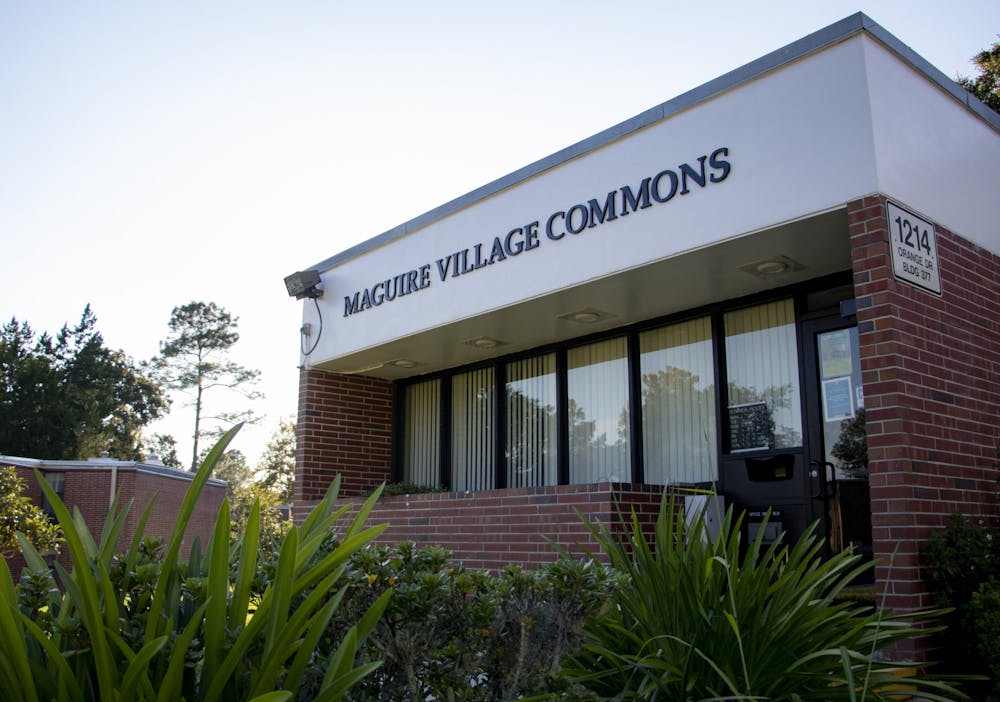Correction: This article has been updated to reflect that the university has not yet approved a plan to build a new residential complex for athletes. A previous version of the article reported otherwise.
UF and the City of Gainesville are moving forward with discussions over providing graduate students with affordable housing.
The talks come after graduate students expressed concerns over plans to demolish Maguire Village and University Village South with no proposals to replace the housing. The lack of room for graduate students on campus would leave them to find housing in the city, which is facing its own affordable housing crisis.
The issue was discussed in a city commission meeting June 10.
In the meeting, Commissioner David Arreola called it counterintuitive to tear down the two buildings without plans to offer housing to those displaced. The only reason his parents were able to move to Gainesville was because of the type of housing Maguire and UVS offer, he said.
“These decisions are going to raise the price of housing for a lot of people,” Arreola said in the meeting.
UF’s budget is about 72% of the total value of taxable property in Gainesville, meaning that any changes to UF’s housing has an impact on the surrounding city, Arreola said.
Additionally, UF plans to build a housing complex for honors students that will open in Fall 2023 adding 1,400 beds total. None of those beds are reserved for graduate students.
An athletic housing complex is also under consideration but has not been approved by the Board of Trustees. If approved, it would add 500 beds to campus. It is still unclear who would live in the complex along with athletes.
The number of honors students living on campus has decreased from Fall 2016 to Fall 2020, going from 1,031 students to 658 students, according to public records.
The honors complex will cost between $175 million and $205 million to build. The athletics housing complex will cost between $60 million and $70 million.
One room in the new complex will cost $4,511 while a double room will cost $4,263 per room per semester starting in 2024, according to public records. Today, the cheapest single room costs $2,930 while the most expensive option costs $3,953. The cheapest double room costs $2,767 while the most expensive option costs $3,735. All prices are set to rise by 4.5% annually.
This is a major shakeup for UF’s housing portfolio,” Arreola said. “They’re talking about closing affordable graduate housing, not replacing it.”
While new housing is a plus for affordability in the long run, housing costs are skyrocketing in the short term, he said.
Arreola said he brought the issue up in a meeting with UF last week prompting plans to continue discussing a way for UF and the city to find a solution.
He suggested UF put money in Alachua County’s affordable housing trust, which was created to fund efforts specifically to make housing more affordable. The trust was created almost a year ago but currently has no money in it, Arreola said.
Although it’s a suggestion Arreola likes, he said there aren’t any specific options that have been discussed yet. The future discussions between the university and the city are meant to find the best solution agreed upon by both parties.
UF’s chief financial officer Chris Cowen said the university doesn’t want to make their situation the city’s problem.
“If we’re closing two dorms and then saying to our married graduate students and families, ‘go find housing,’ for that segment of the graduate student population, their main objective is affordability. And so they would be competing directly with other members of the Gainesville community looking for affordable housing,” Cowen said.
To avoid that, UF plans to partner with two developers by the end of the year, and Cowen said he believes they have identified a potential property to replace the complexes lost.
“We’ve heard graduate students, we understand their needs and we are committed to meeting them just as well as we can,” Cowen said.
Jonathan Orsini, previous president of the Graduate Student Council, said there are 1,469 beds aimed at graduate students and families on campus. Once the two complexes are demolished, there will be 947, a loss of about 36%.
With the problem persisting in the city and no clear messaging from the university, graduate students are still worried about the future.
Thirty-five-year-old Emily Fahey and her husband, an anthropology doctoral student, currently live in Maguire Village with their two daughters. She said she feels at home in the complex.
“We could not afford to live anywhere else in Gainesville without having this cheap, safe option of Maguire and UVS and the other graduate housing villages,” Fahey said.
Isabella Douglas contributed to this report.
Contact Eve Thompson at ethompson@alligator.org. Follow her on Twitter @evealanaa.
Contact Alexander Lugo at alugo@alligator.org. Follow him on Twitter @AlexLugo67.

Alex is a fourth-year journalism student at UF and is in his third semester at The Alligator where he is serving as the university editor. He previously reported on university administration and the city and county commission. In his free time, he enjoys video games, traveling and being outdoors.

Eve Thompson is a third-year journalism major covering Santa Fe. In the past, Eve was a News Assistant on the university desk. When she’s not submitting public records requests or staring at a blank Google doc, Eve can be found on a boat, usually listening to 70s music.






